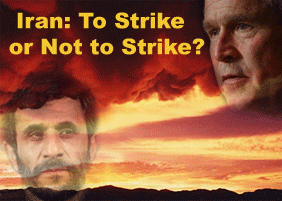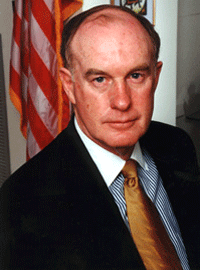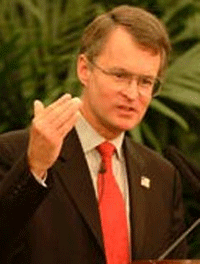


Mahmoud Ahmadinejad's18-pageletter to President Bush has confirmed, among otherthings, one highly disturbing reality: Iran will continuechasing its nuclear program -- and to dismiss the West's warnings todesist from such behavior. More toubling still: just recently, a topIranian Revolutionary Guards commander, Mohammad Ebrahim Dehghani,threatened that Israel would be Iran's first target in response toany U.S. attack. This threat is especially worrisome in light ofIranian President Mahmoud Ahmadinejad's expressed yearning for Israelto be "wiped off the map".
The U.S., Britain and Franceare circulating a Security Council resolution that would makemandatory Iran halting uranium enrichment. They are pushing for theresolution being adopted under Chapter 7 of the U.N. Charter, whichwould make it enforceable by sanctions or military action. But Russiaand China are not co-operating.
Meanwhile, President Bush hasstated that a military option -- potentially a unilateral Americamilitary strike -- is possible if Tehran refuses to stop enrichinguranium and continues to disallow international inspection of itsnuclear program.
How much longer can the U.S.and Israel sit and wait? How much time can we spare once theMullahs have nuclear weapons in their hands?
To discuss these questions withus today, we are joined by:
James Woolsey, a formerdirector of the Central Intelligence Agency (1993-1995).

Lt. Gen. Tom McInerney, theco-author with Maj. Gen. Paul Vallely on their book Endgame: TheBlueprint for Victory in the War on Terror. He is a retired Air ForceFighter Pilot who has been a Fox News Military Analyst for the lastfour and a half years and continues to appear regularly on Fox. Hejust returned from his second visit to Iraq in December,2005.

and
Kenneth R. Timmerman, theauthor of Countdown to Crisis: the Coming Nuclear Showdown with Iran(Crown Forum, New York), and Executive Director of the Foundation forDemocracy in Iran.

FP: James Woolsey, TomMcInerney and Ken Timmerman, welcome to FrontpageSymposium.
Mr. Woolsey, let's crystallizethe key issues: does Iran have nuclear weapons? What is thedanger? What must we do about it?
Woolsey: Few would suggest thatIran has nuclear weapons yet, but it seems to be making progress onoperating a cascade of gas centrifuges and claims it has enricheduranium up to fuel grade.
How soon it could have a weapondepends very heavily on the progress of this enrichment process(unless, say, the North Koreans helped them end-run it and sold Iranenough plutonium or highly enriched uranium for a bomb).
With a few centrifuges it wouldtake them years to enrich enough uranium for a bomb, but with manythousands they could do the job in weeks. Our knowledge about this isspotty, as is our understanding of the quality of the centrifuges,which can also affect the pace substantially. Once they have enoughfissile material for a bomb, a simple device of the sort of design ofour Hiroshima bomb is, unfortunately, not hard to put together. Awarhead for a missile would take more work.
This is all of course extremelydangerous, given especially the genocidal fanaticism of the Iranianregime. I would seriously doubt that either Russia or China wouldagree to any effective sanctions in light of their commercialinterests in Iran.
I would advocate, prior to anyuse of force, that we try to assemble a group of nations that wouldtake tough actions to try to effect a regime change: e.g. a blockadeagainst Iran's imports of refined petroleum products (they do notrefine most of the petroleum they use).
I will defer to Tom McInerneyregarding the design and effect of an air campaign. I would only addthat I agree with John McCain that the use of force in this case isthe worst option except for one: letting this regime have nuclearweapons.
One more point - if we useforce we must take out the instruments used by the regime toterrorize the Iraqi people &endash; e.g. the Basiji, theRevolutionary Guards, etc. It would be a very bad idea just to strikeat the regime's known nuclear facilities and to leave the regimeintact.
FP: Thank you Mr.Woolsey.
Lt. Gen. TomMcInerney?
McInerney: One of the nicethings about following Jim Woolsey is that I agree with all he hassaid. We all want to solve this diplomatically but my reading is thatIran thinks the U.S. is pinned down and does not have the will.Russia and China are our enemies in this endeavor and willensure that any UNSC action fails, including Chapter 7, so Ithink we have to form a coalition of the willing composed of SaudiArabia, Egypt, Jordan, UAE, Qatar, Kuwait, Turkey, Australia, EU 3plus other willing NATO countries.
Now not all will join but wemust tell them that we want a diplomatic settlement and need theirsupport. If diplomacy fails then they must be prepared to help in themilitary option. We must find out if they will accept Iranian nuclearhegemony in the region. My sources say they will not. So we must getthem involved.
My military option is primarilyled by a stealth force of 64 AC composed B2s, F 22s and F 117s and400 non-stealth aircraft, plus 500 cruise missiles hitting 1500 aimpoints with precision weapons. The targets would be the NuclearDevelopment facilities, Air Defense forces, Air Forces, Naval Forces,Shahab 3 missile forces and Command and Control nodes over a36&endash;48 hour time frame.
I would then let pre-plannedcovert forces assist the Iranian people in taking their country backwith precision air support as required. This is the model used inAfghanistan and we must be training it now. It will take time butIran is ripe to have this implemented. We have at most one yearuntil we must take action in my opinion.
I believe Israel must be keptout of this. They will only complicate a complicatedproblem.
FP: Lt. Gen. Tom McInerney,your plan for taking out the Mullahs' nuclear capability and thenhelping Iranians dislodge their ruling tyrants sounds great -- and itwould be wonderful if it could really happen that way. But are wesure it is all that easy? What happens exactly if things don't go asplanned? What are the negative possibilities here? (i.e. Iran'scounter-strikes etc.)
Mr. Timmerman?
Timmerman: I am not used tobeing in such good company, and thank Jim Woolsey for lucidly andsuccinctly stating the case of what we know and don't know aboutIran's nuclear weapons program, and Tom McInerney for laying out oneof several military strike packages should our political leaders failto seize one of several better alternatives now available.
I would emphasize thefollowing.
The National IntelligenceEstimate on Iran's nuclear program, leaked several months ago to thepress and reaffirmed recently by John Negroponte, creates a falsesense of security by claiming that Iran is five and possibly tenyears away from weapons capability. In fact, there are huge gaps inour intelligence.
If Iran used the 2,500centrifuges they have acknowledged importing from the A.Q. Khannetwork in the 1990s, they could already have enough nuclear weaponsmaterial for 20-25 bombs. To believe that they do not have thatweapons material, you must believe their official story: that theyspent in excess of $600 million on the black market to purchase thatequipment, risked international condemnation, and then kept thecentrifuges in crates in a warehouse for eight years without evertouching them.
Moreover, I have received anumber of credible reports, from former Iranian intelligence officersand other Iranians whose contacts within the regime have proven to beaccurate over many years, that indicate the regime has a parallel,clandestine uranium enrichment program outside of the facilities theyhave been forced to declare to the International Atomic EnergyAgency.
If this information turns outto be true, then all bets are off. As Jim mentioned, Iran could builda Hiroshima-type weapon rapidly; high school seniors in the U.S. havereplicated it, and Iran has invested heavily in science and matheducation (more than we have).
But we have a secret weapon,and that is the people of Iran. There are strong indications of abroad-based rejection of the regime and pro-American sentiments amongthe Iranian people. New defectors arrive almost daily in the West.The most recent is Amir Abas Fakrevar, a student leader who hasjoined the High Council of the Iranian Referendum Movement. Hemanaged to escape Iran in late April 2006.
However, we need to understandthe history of the Islamic Revolution, and avoid severaltraps.
Trap number one: we must notfall for the allure of false democratic movements, such as theMujehedin-e Khalq. This Islamist-Marxist cult hides behind a numberof fronts, including the National Council of Resistance and a host ofU.S.-based "Iranian-American community" groups, and pretends tosupport democratic ideals. But make no mistake. The Mujahedinmurdered Americans in the 1970s, took part in the Khomeinistrevolution, helped the regime seize the U.S. embassy and take U.S.diplomats hostage in 1979, and remains committed to an Islamist statein Iran. Additionally, the MEK has aroused widespread hatred in Iranbecause it sided with Saddam Hussein during the 1980-1988 Iran-Iraqwar.
We have many good options forsupporting the legitimate and admirable aspirations of the Iranianpeople to bring freedom to their country, but the MEK is not one ofthem. On the contrary, support for the MEK would alienate theoverwhelming majority of Iranian patriots, who today look to Americafor leadership, encouragement, and material assistance inoverthrowing the clerical dictatorship.
Trap number two: we must notfall for so-called "reformists," who tell the State Department (andothers) that "moderates" exist within the clerical leadership whowill walk away from the bearded boy president, MahmoudAhmadinejad.
If you remember nothing elseabout the "moderates" within Iran's ruling clergy, remember this:Rafsanjani, often called the mullah we can "do business with," is thefather of Iran's nuclear weapons program.
Woolsey: As we try, onehopes, over the next year or so to bring about a regime changewithout needing to go to war, we should keep Iran's imperial naturein mind. A bare majority of Persians rule restive minorities ofArabs, Azeris, Kurds, Baluch, and others. Just as we need to exploitthe resistance to the regime among young people, reformers, andwomen, we also need to pay attention to its geographic and ethnicfissures - a large share of Iran's oil, e g, is in the restiveArab-populated south.
We can't do this successfullyif stability is our paramount goal and we refuse to exploit thesedivisions in its name. It should not be difficult to see that Iran istoday ruled with an iron hand by genocidal fanatics with a vigorousnuclear weapons program and, for some of them, explicit enthusiasmfor mass death and even for the end of the world.
What case can anyone make forregarding the continued existence of this regime as anything but anunprecedented tragedy waiting to happen?
MacInerney: In general, I thinkwe are in violent agreement except for one or two issues.
Primarily we have to enable theIranian people to retake their country. This is not easy -- as we arefinding out in Iraq -- but we have had three successful electionsthere and now the steps for formation of a new government.
None of it is easy but justbecause it is difficult doesn't mean it should not be done. Thechange in this region will be very challenging but notinsurmountable.
We should exploit the divergentpopulation of 51% Persian, 34% Azerbaijanis and Kurds, and 2% Arabsplus others. Virtually all the oil is located in the southwest regionclose to the Persian Gulf and very vulnerable to being isolated andto covert action. Seventy percent of the population is under 30 andthe jobless rate hovers near 20 percent. This is a perfectcombination for a covert campaign.
I believe an independentassessment needs to be done on the value added of the MEK and theNCRI to this campaign. The Iranian Government fears them as a threatand I am interested in their role today, not 25 years ago. In anycase, let's get a re-evaluation of their value added or valuediminished role. We must seriously fund and work toward this campaignstarting immediately to include a Government in Exile and a Coalitionof the willing in the region using their inputs for asolution.
Timmerman: Both Jim and Tom areright to point to Iran's ethnic diversity, a fact that is notappreciated or understood by many. Real vulnerabilities exist.Persians dominate Iran's historic heartland, but ethnic minoritiespopulate the periphery. Indeed, nearly every international border ofIran is dominated by non-Persian minorities.
But we must be careful how weexploit these potential internal lines of fracture. I have alwayscounselled my friends in the Balouchi, Kurdish, Azeri, and Turkomencommunities not to opt for separatist agendas, and I would counselthe U.S. government to avoid this as well. Why? Because the specterof ethnic separatism in Iran drives Persians nuts. If our goal is tohelp the Iranian people to liberate themselves from clericaldictatorship, it would be counter-productive to drive the Persianmajority into the arms of the regime. But that is what we would do byfuelling separatist wars. We would make the regime the de factochampion of Iranian nationalism &endash; definitely not ourgoal.
So my message has always beento the ethnic movements: put the focus on freedom from the clerics,not on separatist agendas. Find common cause with otherfreedom-fighters. In the free, democratic Iran of tomorrow you willfind freedom for your own community &endash; as Iraniansfirst.
I vigorously oppose any supportfor the MEK on similar grounds. This is a group that attempted toinvade Iran militarily in April 1988 with the help of SaddamHussein's army, and was repulsed by 16-year old kids and grandfathersarmed, literally, with pitchforks. The overwhelming majority ofIranians consider them as traitors. And because they made commoncause with Khomeini during the Revolution and for the first two yearsof the Islamic regime, many Iranians do not see a significantdifference between the MEK and the current regime. They are two sidesof the same coin. The only reason the MEK is in the opposition isbecause they lost a power struggle. When considering Rajavi (the MEKcult leader), remember Trotsky.
The MEK has for years claimedto head a "coalition" that formed a "parliament-in-exile." In fact,the 500-or so front groups that belong to this "coalition" are justMEK fronts &endash;and some of them just individuals - notindependent groups. Ultimately, they elevated the leader's wifeto become "president-elect."
President-elect? Hullo? Ofwhat? By whom?
This is a group that was formedby the KGB in the 1960s and 1970s as part of the internationalliberation movement against the United States and its allies. Inrecent years, they have become adept at playing to the globo-Left, aswell as to some, on the right, who are seeking ready-made solutionsto the threat from a nuclear-armed Iran.
We should not fear the complexmosaic that is Persian society and politics. Our best option in myview is for President Bush to appoint a personal emissary, with therank of Ambassador, to the Iranian freedom movement, who will convenethe equivalent of a loya jirga of several hundred prominent Iranianleaders. The majority of those able to attend such a meeting will ofnecessity come from the diaspora; some will come secretly from theinside.
We are seeing the beginnings ofa broad coalition coalescing around the Iran Referendum Movement, butit is not yet there. They need quiet, sympathetic assistance; and,from time to time, someone with authority to read the riot act.
The real key is harnessing thetremendous diversity of the pro-freedom movement and getting them toset aside personality and partisan bickering. The model should besomething akin to the Continental Congress; not the Bolshevistavante-garde. We don't need to replace today's clerical murderers inIran with another group of headsmen.
Woolsey: Iran (and theclosely-tied fate of Iraq) constitutes a test case for the post-coldwar world. The substantial growth in democracy and the rule of lawthat has marked the last 60 years may be reversed, catastrophically,if we accept a reverse evolution - imperial behavior in their regionsby oil-rich autocratic states, worst of all those, such as Iran,whose imperialism is fired by fanaticism.
As Tom Friedman demonstrates inthe recent issue of Foreign Policy, the price of oil and the path offreedom now move in opposite directions. It is not accidental, asRussians are fond of saying, that we see Russia, Venezuela, and Iranmoving more deeply into dictatorship and, in heavy-handed ways, alsomoving to assert regional dominance at the expense of democracy andliberty. Every time we pull up to the gasoline pump we help pay forthe tyrants' side in this growing 21st-century struggle betweendespotism funded by oil exports and the rest of us. Yes, we mustblock Iran's nuclear weapons program. But we will only be able todeal effectively with Iran and those who travel with it on the roadof dictatorship and oppression if we move away from oil dependence.It's long past time for prompt, fundamental steps to this end - asubject for another day.
MacInerney: Again I believe weare all in general agreement on what needs to be done and basicallyhow to do it. The skills of Changing a Regime from within havebeen lost by our CIA, State and Defense Departments thanksto the Church Committee and all following Administrations.
We must regain these skills andwork with a Coalition of the Willing covertly to implement thisRegime Change. Ken is exactly right in that the US has a relativelyhigh degree of popularity in Iran that must not be squandered. Theabsolute dislike and hatred for the present regime is widespread andfuels the popularity of the US.
Our positive actions inAfghanistan and Iraq to bring democracy and freedom to thesecountries has not been lost on the Iranians despite Western mediaattempts to play it otherwise.
The Iranian people are notrising up in the streets to protest ourinvolvement with their neighbors but harbor a deep hopethat they will soon join them in the same freedoms andenlightenment.
Russia and China will remainmajor impediments to these freedoms as Jim points out. Again not aneasy challenge but better that the nuclear alternative that awaitsinaction.
Ken is right that their abilityto build nuclear weapons is much closer that Mr Negroponte'spronouncements of 5-10 years.
Decision time isnow.
FP: Ken Timmerman, last wordgoes to you sir.
Timmerman: I think PresidentBush should take the opportunity presented by the 18-pages of drivelfrom Ahmadinejad to send a reply &endash; not to the bearded boypresident, whom I leave to Tom McInerney and the U.S. Air Force&endash; but to the people of Iran.
The President should reaffirmhis commitment to helping them to achieve their freedom, and thenpledge material assistance.
He should announce that he isappointing a high-level emissary to the Free People of Iran. Why notDick Cheney? That will get the regime's attention.
Cheney (or whoever) should thenconvene a loya jirga of Iranian opposition leaders who are committedto freedom, pluralism, secularism, and the rule of law. The IranReferendum Movement has already made good progress in this direction,bringing former political adversaries together into 38 committeesaround the world. From these committees, 250 delegates were selectedfor a general convention that met in Brussels in December 2005. Thisconvention elected a 15-member High Council, which in turn appointeda 7-member executive board. That is democracy in action, and is agood start.
The President should alsopledge that he will ask Congress to commit the necessary resources -$300 million minimum, $500 million would be better &endash; to carryout the plan developed by the loya jirga. We need to get money andequipment into Iran to help the freedom fighters wage politicalwarfare.
People object that we don'thave the time to focus on regime change from within. But remember:Ceaucescu fell in just two days.
We have a moral obligation toat least give it a try, because the only other options areappeasement or war, either one of which could very quickly spiral outof our control.
FP: James Woolsey, TomMcInerney and Ken Timmerman, thank you for joining FrontpageSymposium.